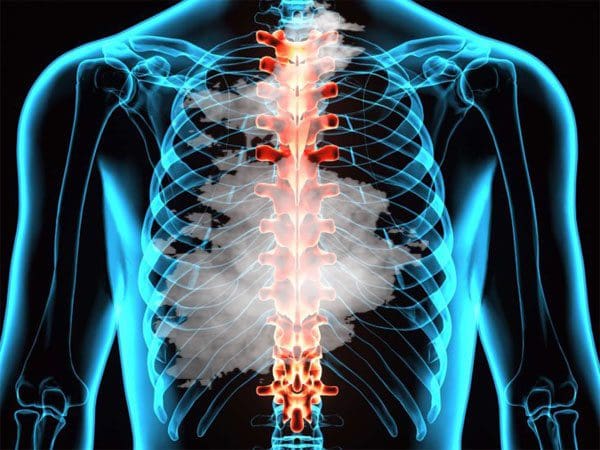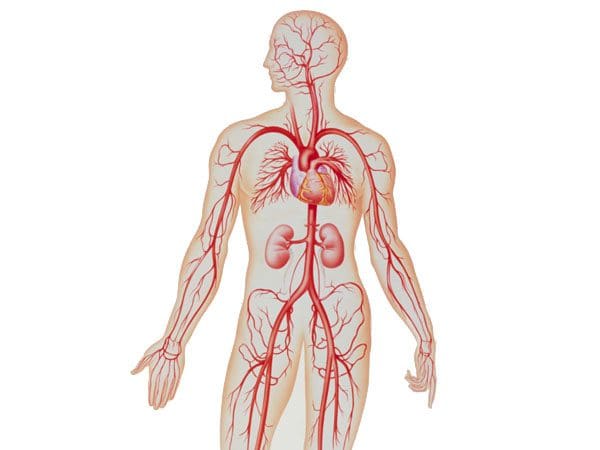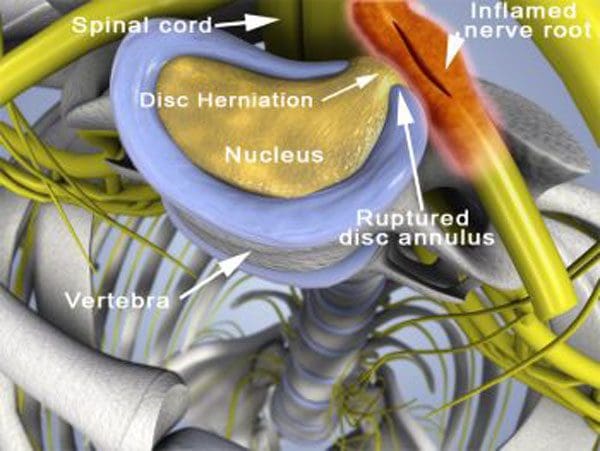Smoking negatively impacts an individual’s health, as most know about its effect on the lungs. However, it can cause chronic back pain, and affect spinal health, as well. Research has discovered that having a history of smoking, hypertension/high blood pressure, and coronary artery disease are all risk factors for atherosclerosis and have a significant connection with low back pain development.

Despite all the anti-smoking ads created by The American Lung Association or American Cancer Society showing longtime smokers with tracheotomies, oxygen tanks, etc, individuals continue to smoke.
Table of Contents
Risks associated with smoking
- High increase for many cancers
- Increased risk for heart disease
- Injury/s, wound/s take longer to heal
- Increased risk of infection after surgery
- Aggravating pre-existing health conditions like asthma
- Chronic back pain
Chronic pain and blood vessels
Smoking can generate general body pain that can overwhelm the vascular system. These are the blood vessels that include:
- Arteries
- Capillaries
- Veins

Smoking’s primary impact is on blood flow and circulation. The blood becomes thick and sticky, which makes the heart have to work harder to circulate the blood. This thickening and lack of proper circulation can cause blood clots, as well as, damage muscles, tendons, and the other spinal structures, like the discs.
Individuals that smoke have issues with healing properly from injuries/wounds, as well. This means if a disc or nerve gets injured it takes longer to heal or does not heal properly/completely.
- Smoking contributes to continued inflammation, which can increase pain
- It can interfere with prescribed medications for pain management/other conditions
- Proper absorption of minerals, nutrients, chemicals, medications, is disrupted
- Damage to the spinal discs and facet joints

The pain can come from the neuron stimulation from the nicotine, as well as the other chemicals and toxins in the smoke itself.
Back Pain Worsened
There are spinal conditions like dried out/desiccated discs, or osteoporosis, that could’ve been caused or worsened through smoking.
Degenerative Disc Disease
Smoking is connected to the development of this disease, also known as disc dehydration. Smoke toxins, as well as, nicotine contributes to dehydrated discs and the cellular damage done to the vascular system.
Osteoporosis
It is associated with a higher risk of osteoporosis/thin bones, which can lead to an increased risk for spinal fractures.
Fibromyalgia
Individuals that smoke and have fibromyalgia report intensified symptoms, quality of life is worse, and an increase in anxiety compared to non-smokers with fibromyalgia.
Spinal Fusion
Smoking can delay or prevent proper healing/fusion when trying to permanently connect the vertebrae. The negative impacts can lead to worse surgical outcomes.
Sleep and Mood
It can also negatively influence mood and sleep quality. It is a vicious cycle for individuals that are depressed, have pain, or anxiety. Because of the tendency to smoke more in order to cope. However, this is very unhealthy and only leads to worse pain and other health issues.

Quitting
It can absolutely be done with the right resources. Various therapies can help an individual to quit smoking.
- Medications
- Cognitive-behavioral therapy
- Hypnosis
- Acupuncture
- Chiropractic for spinal alignment and blood circulation
Quitting improves an individual’s lifespan, quality of life, reduces the chances of chronic disease, and alleviates pain. Talk with a primary care physician about a treatment plan that can include nicotine replacement therapy, counseling, and support.
Depression and Chronic Pain Therapy
Dr. Alex Jimenez’s Blog Post Disclaimer
The scope of our information is limited to chiropractic, musculoskeletal, physical medicines, wellness, and sensitive health issues and/or functional medicine articles, topics, and discussions. We use functional health & wellness protocols to treat and support care for injuries or disorders of the musculoskeletal system. Our posts, topics, subjects, and insights cover clinical matters, issues, and topics that relate and support directly or indirectly our clinical scope of practice.*
Our office has made a reasonable attempt to provide supportive citations and has identified the relevant research study or studies supporting our posts. We also make copies of supporting research studies available to the board and or the public upon request. We understand that we cover matters that require an additional explanation as to how it may assist in a particular care plan or treatment protocol; therefore, to further discuss the subject matter above, please feel free to ask Dr. Alex Jimenez or contact us at 915-850-0900. The provider(s) Licensed in Texas& New Mexico*
References
Green, Bart N, et al. “Association Between Smoking and Back Pain in a Cross-Section of Adult Americans.” Cureus vol. 8,9 e806. 26 Sep. 2016, doi:10.7759/cureus.806
Post Disclaimer
Professional Scope of Practice *
The information on this blog site is not intended to replace a one-on-one relationship with a qualified healthcare professional or licensed physician and is not medical advice. We encourage you to make healthcare decisions based on your research and partnership with a qualified healthcare professional.
Blog Information & Scope Discussions
Welcome to El Paso's Premier Wellness and Injury Care Clinic & Wellness Blog, where Dr. Alex Jimenez, DC, FNP-C, a board-certified Family Practice Nurse Practitioner (FNP-BC) and Chiropractor (DC), presents insights on how our team is dedicated to holistic healing and personalized care. Our practice aligns with evidence-based treatment protocols inspired by integrative medicine principles, similar to those found on this site and our family practice-based chiromed.com site, focusing on restoring health naturally for patients of all ages.
Our areas of chiropractic practice include Wellness & Nutrition, Chronic Pain, Personal Injury, Auto Accident Care, Work Injuries, Back Injury, Low Back Pain, Neck Pain, Migraine Headaches, Sports Injuries, Severe Sciatica, Scoliosis, Complex Herniated Discs, Fibromyalgia, Chronic Pain, Complex Injuries, Stress Management, Functional Medicine Treatments, and in-scope care protocols.
Our information scope is limited to chiropractic, musculoskeletal, physical medicine, wellness, contributing etiological viscerosomatic disturbances within clinical presentations, associated somato-visceral reflex clinical dynamics, subluxation complexes, sensitive health issues, and functional medicine articles, topics, and discussions.
We provide and present clinical collaboration with specialists from various disciplines. Each specialist is governed by their professional scope of practice and their jurisdiction of licensure. We use functional health & wellness protocols to treat and support care for the injuries or disorders of the musculoskeletal system.
Our videos, posts, topics, subjects, and insights cover clinical matters and issues that relate to and directly or indirectly support our clinical scope of practice.*
Our office has made a reasonable effort to provide supportive citations and has identified relevant research studies that support our posts. We provide copies of supporting research studies available to regulatory boards and the public upon request.
We understand that we cover matters that require an additional explanation of how they may assist in a particular care plan or treatment protocol; therefore, to discuss the subject matter above further, please feel free to ask Dr. Alex Jimenez, DC, APRN, FNP-BC, or contact us at 915-850-0900.
We are here to help you and your family.
Blessings
Dr. Alex Jimenez DC, MSACP, APRN, FNP-BC*, CCST, IFMCP, CFMP, ATN
email: coach@elpasofunctionalmedicine.com
Licensed as a Doctor of Chiropractic (DC) in Texas & New Mexico*
Texas DC License # TX5807
New Mexico DC License # NM-DC2182
Licensed as a Registered Nurse (RN*) in Texas & Multistate
Texas RN License # 1191402
ANCC FNP-BC: Board Certified Nurse Practitioner*
Compact Status: Multi-State License: Authorized to Practice in 40 States*
Graduate with Honors: ICHS: MSN-FNP (Family Nurse Practitioner Program)
Degree Granted. Master's in Family Practice MSN Diploma (Cum Laude)
Dr. Alex Jimenez, DC, APRN, FNP-BC*, CFMP, IFMCP, ATN, CCST
My Digital Business Card


